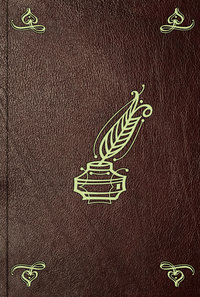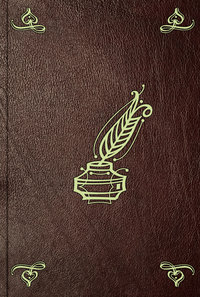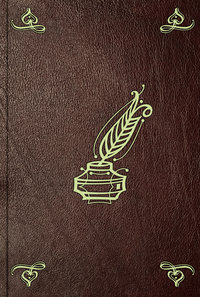 полная версия
полная версияThe Works of John Dryden, now first collected in eighteen volumes. Volume 12
TRANSLATIONS FROM OVID'S EPISTLES
PREFACE TO THE TRANSLATION OF OVID'S EPISTLES. 2
The Life of Ovid being already written in our language, before the translation of his Metamorphoses, I will not presume so far upon myself, to think I can add any thing to Mr Sandys his undertaking.3
The English reader may there be satisfied, that he flourished in the reign of Augustus Cæsar; that he was extracted from an ancient family of Roman knights; that he was born to the inheritance of a splendid fortune;4 that he was designed to the study of the law, and had made considerable progress in it, before he quitted that profession, for this of poetry, to which he was more naturally formed. The cause of his banishment is unknown; because he was himself unwilling further to provoke the emperor, by ascribing it to any other reason than what was pretended by Augustus, which was, the lasciviousness of his Elegies, and his Art of Love.5 It is true, they are not to be excused in the severity of manners, as being able to corrupt a larger empire, if there were any, than that of Rome; yet this may be said in behalf of Ovid, that no man has ever treated the passion of love with so much delicacy of thought, and of expression, or searched into the nature of it more philosophically than he. And the emperor, who condemned him, had as little reason as another man to punish that fault with so much severity, if at least he were the author of a certain epigram, which is ascribed to him, relating to the cause of the first civil war betwixt himself and Mark Antony the triumvir, which is more fulsome than any passage I have met with in our poet.6
To pass by the naked familiarity of his expressions to Horace, which are cited in that author's life, I need only mention one notorious act of his, in taking Livia to his bed, when she was not only married, but with child by her husband then living. But deeds, it seems, may be justified by arbitrary power, when words are questioned in a poet. There is another guess of the grammarians, as far from truth as the first from reason; they will have him banished for some favours, which they say he received from Julia, the daughter of Augustus, whom they think he celebrates under the name of Corinna in his Elegies; but he, who will observe the verses which are made to that mistress, may gather from the whole contexture of them, that Corinna was not a woman of the highest quality. If Julia were then married to Agrippa, why should our poet make his petition to Isis for her safe delivery, and afterwards condole her miscarriage; which, for aught he knew, might be by her own husband? Or, indeed, how durst he be so bold to make the least discovery of such a crime, which was no less than capital, especially committed against a person of Agrippa's rank? Or, if it were before her marriage, he would surely have been more discreet, than to have published an accident which must have been fatal to them both. But what most confirms me against this opinion, is, that Ovid himself complains, that the true person of Corinna was found out by the fame of his verses to her; which if it had been Julia, he durst not have owned; and, beside, an immediate punishment must have followed. He seems himself more truly to have touched at the cause of his exile in those obscure verses:
Cur aliquid vidi? cur noxia lumina feci?Cur imprudenti cognita culpa mihi est?Inscius Actæon vidit sine veste Dianam,Præda fuit canibus non minus ille suis.Namely, that he had either seen, or was conscious to somewhat, which had procured him his disgrace. But neither am I satisfied, that this was the incest of the emperor with his own daughter: for Augustus was of a nature too vindicative to have contented himself with so small a revenge, or so unsafe to himself, as that of simple banishment; but would certainly have secured his crimes from public notice, by the death of him who was witness to them. Neither have historians given us any sight into such an action of this emperor: nor would he, (the greatest politician of his time,) in all probability, have managed his crimes with so little secrecy, as not to shun the observation of any man. It seems more probable, that Ovid was either the confident of some other passion, or that he had stumbled, by some inadvertency, upon the privacies of Livia, and seen her in a bath: for the words
Sine veste Dianam, agree better with Livia, who had the fame of chastity, than with either of the Julias, who were both noted of incontinency. The first verses, which were made by him in his youth, and recited publicly, according to the custom, were, as he himself assures us, to Corinna: his banishment happened not until the age of fifty; from which it may be deduced, with probability enough, that the love of Corinna did not occasion it: nay, he tells us plainly, that his offence was that of error only, not of wickedness; and in the same paper of verses also, that the cause was notoriously known at Rome, though it be left so obscure to after-ages.7
But to leave conjectures on a subject so uncertain,8 and to write somewhat more authentic of this poet. That he frequented the court of Augustus, and was well received in it, is most undoubted: all his poems bear the character of a court, and appear to be written, as the French call it, cavalierement: add to this, that the titles of many of his elegies, and more of his letters in his banishment, are addressed to persons well known to us, even at this distance, to have been considerable in that court.
Nor was his acquaintance less with the famous poets of his age, than with the noblemen and ladies. He tells you himself, in a particular account of his own life, that Macer, Horace, Tibullus,9 Propertius, and many others of them, were his familiar friends, and that some of them communicated their writings to him; but that he had only seen Virgil.
If the imitation of nature be the business of a poet, I know no author, who can justly be compared with ours, especially in the description of the passions. And, to prove this, I shall need no other judges than the generality of his readers: for, all passions being inborn with us, we are almost equally judges, when we are concerned in the representation of them. Now I will appeal to any man, who has read this poet, whether he finds not the natural emotion of the same passion in himself, which the poet describes in his feigned persons. His thoughts, which are the pictures and results of those passions, are generally such as naturally arise from those disorderly motions of our spirits. Yet, not to speak too partially in his behalf, I will confess, that the copiousness of his wit was such, that he often writ too pointedly for his subject, and made his persons speak more eloquently than the violence of their passion would admit: so that he is frequently witty out of season; leaving the imitation of nature, and the cooler dictates of his judgment, for the false applause of fancy. Yet he seems to have found out this imperfection in his riper age; for why else should he complain, that his Metamorphoses was left unfinished? Nothing sure can be added to the wit of that poem, or of the rest; but many things ought to have been retrenched, which I suppose would have been the business of his age, if his misfortunes had not come too fast upon him. But take him uncorrected, as he is transmitted to us, and it must be acknowledged, in spite of his Dutch friends, the commentators, even of Julius Scaliger himself, that Seneca's censure will stand good against him;
Nescivit quod bene cessit relinquere:he never knew how to give over, when he had done well, but continually varying the same sense an hundred ways, and taking up in another place what he had more than enough inculcated before, he sometimes cloys his readers, instead of satisfying them; and gives occasion to his translators, who dare not cover him, to blush at the nakedness of their father. This, then, is the allay of Ovid's writings, which is sufficiently recompensed by his other excellencies: nay, this very fault is not without its beauties; for the most severe censor cannot but be pleased with the prodigality of his wit, though at the same time he could have wished that the master of it had been a better manager. Every thing which he does becomes him; and if sometimes he appears too gay, yet there is a secret gracefulness of youth, which accompanies his writings, though the staidness and sobriety of age be wanting. In the most material part, which is the conduct, it is certain, that he seldom has miscarried: for if his Elegies be compared with those of Tibullus and Propertius, his contemporaries, it will be found, that those poets seldom designed before they writ; and though the language of Tibullus be more polished, and the learning of Propertius, especially in his fourth book, more set out to ostentation; yet their common practice was to look no further before them than the next line; whence it will inevitably follow, that they can drive to no certain point, but ramble from one subject to another, and conclude with somewhat, which is not of a piece with their beginning:
Purpureus latè qui splendeat, unus et alterAssuitur pannus, —as Horace says; though the verses are golden, they are but patched into the garment. But our poet has always the goal in his eye, which directs him in his race; some beautiful design, which he first establishes, and then contrives the means, which will naturally conduct him to his end. This will be evident to judicious readers in his Epistles, of which somewhat, at least in general, will be expected.
The title of them in our late editions is Epistolæ Heroidum, the Letters of the Heroines. But Heinsius has judged more truly, that the inscription of our author was barely, Epistles; which he concludes from his cited verses, where Ovid asserts this work as his own invention, and not borrowed from the Greeks, whom (as the masters of their learning) the Romans usually did imitate. But it appears not from their writings, that any of the Grecians ever touched upon this way, which our poet therefore justly has vindicated to himself. I quarrel not at the word Heroidum, because it is used by Ovid in his Art of Love:
Jupiter ad veteres supplex Heroidas ibat.But, sure, he could not be guilty of such an oversight, to call his work by the name of Heroines, when there are divers men, or heroes, as, namely, Paris, Leander, and Acontius, joined in it. Except Sabinus, who writ some answers to Ovid's Letters,
(Quam celer è toto rediit meus orbe Sabinus,)I remember not any of the Romans, who have treated on this subject, save only Propertius, and that but once, in his Epistle of Arethusa to Lycotas, which is written so near the style of Ovid, that it seems to be but an imitation; and therefore ought not to defraud our poet of the glory of his invention.
Concerning the Epistles, I shall content myself to observe these few particulars: first, that they are generally granted to be the most perfect pieces of Ovid, and that the style of them is tenderly passionate and courtly; two properties well agreeing with the persons, which were heroines, and lovers. Yet, where the characters were lower, as in Œnone and Hero, he has kept close to nature, in drawing his images after a country life, though perhaps he has romanized his Grecian dames too much, and made them speak, sometimes, as if they had been born in the city of Rome, and under the empire of Augustus. There seems to be no great variety in the particular subjects which he has chosen; most of the Epistles being written from ladies, who were forsaken by their lovers: which is the reason that many of the same thoughts come back upon us in divers letters: but of the general character of women, which is modesty, he has taken a most becoming care; for his amorous expressions go no further than virtue may allow, and therefore may be read, as he intended them, by matrons without a blush.
Thus much concerning the poet: it remains that I should say somewhat of poetical translations in general, and give my opinion, (with submission to better judgments,) which way of version seems to be the most proper.
All translation, I suppose, may be reduced to these three heads.
First, that of metaphrase, or turning an author word by word, and line by line, from one language into another. Thus, or near this manner, was Horace his Art of Poetry translated by Ben Jonson. The second way is that of paraphrase, or translation with latitude, where the author is kept in view by the translator, so as never to be lost, but his words are not so strictly followed as his sense; and that too is admitted to be amplified, but not altered. Such is Mr Waller's translation of Virgil's fourth Æneid. The third way is that of imitation, where the translator (if now he has not lost that name) assumes the liberty, not only to vary from the words and sense, but to forsake them both as he sees occasion; and, taking only some general hints from the original, to run divisions on the ground-work, as he pleases. Such is Mr Cowley's practice in turning two Odes of Pindar, and one of Horace, into English.
Concerning the first of these methods, our master Horace has given us this caution:
Nec verbum verbo curabis reddere, fidusInterpres—Nor word for word too faithfully translate;as the Earl of Roscommon has excellently rendered it. Too faithfully is, indeed, pedantically: it is a faith like that which proceeds from superstition, blind and zealous. Take it in the expression of Sir John Denham to Sir Richard Fanshaw, on his version of the Pastor Fido:
That servile path thou nobly dost decline,Of tracing word by word, and line by line:A new and nobler way thou dost pursue,To make translations and translators too:They but preserve the ashes, thou the flame,True to his sense, but truer to his fame.It is almost impossible to translate verbally, and well, at the same time; for the Latin (a most severe and compendious language) often expresses that in one word, which either the barbarity, or the narrowness, of modern tongues cannot supply in more. It is frequent, also, that the conceit is couched in some expression, which will be lost in English:
Atque iidem venti vela fidemque ferent.What poet of our nation is so happy as to express this thought literally in English, and to strike wit, or almost sense, out of it?
In short, the verbal copier is encumbered with so many difficulties at once, that he can never disentangle himself from all. He is to consider, at the same time, the thought of his author, and his words, and to find out the counterpart to each in another language; and, besides this, he is to confine himself to the compass of numbers, and the slavery of rhyme. It is much like dancing on ropes with fettered legs: a man may shun a fall by using caution; but the gracefulness of motion is not to be expected: and when we have said the best of it, it is but a foolish task; for no sober man would put himself into a danger for the applause of escaping without breaking his neck. We see Ben Jonson could not avoid obscurity in his literal translation of Horace, attempted in the same compass of lines: nay, Horace himself could scarce have done it to a Greek poet:
Brevis esse laboro, obscurus fio:either perspicuity or gracefulness will frequently be wanting. Horace has indeed avoided both these rocks in his translation of the three first lines of Homer's Odyssey, which he has contracted into two:
Dic mihi, musa virum, captæ post tempora Trojæ,Que mores hominum multorum vidit, et urbes.Muse speak the man, who, since the siege of Troy,So many towns, such change of manners saw.Roscommon.But then the sufferings of Ulysses, which are a considerable part of that sentence, are omitted:
Ὃς μάλα πολλὰ πλὰγχθη.The consideration of these difficulties, in a servile, literal translation, not long since made two of our famous wits, Sir John Denham,10 and Mr Cowley, to contrive another way of turning authors into our tongue, called, by the latter of them, imitation. As they were friends, I suppose they communicated their thoughts on this subject to each other; and therefore their reasons for it are little different, though the practice of one is much more moderate. I take imitation of an author, in their sense, to be an endeavour of a later poet to write like one, who has written before him, on the same subject; that is, not to translate his words, or to be confined to his sense, but only to set him as a pattern, and to write, as he supposes that author would have done, had he lived in our age, and in our country.
Yet I dare not say, that either of them have carried this libertine way of rendering authors (as Mr Cowley calls it) so far as my definition reaches; for, in the Pindaric odes, the customs and ceremonies of ancient Greece are still preserved. But I know not what mischief may arise hereafter from the example of such an innovation, when writers of unequal parts to him shall imitate so bold an undertaking. To add and to diminish what we please, which is the way avowed by him, ought only to be granted to Mr Cowley, and that too only in his translation of Pindar; because he alone was able to make him amends, by giving him better of his own, whenever he refused his author's thoughts. Pindar is generally known to be a dark writer, to want connection, (I mean as to our understanding,) to soar out of sight, and leave his reader at a gaze. So wild and ungovernable a poet cannot be translated literally; his genius is too strong to bear a chain, and, Samson-like, he shakes it off. A genius so elevated and unconfined as Mr Cowley's, was but necessary to make Pindar speak English, and that was to be performed by no other way than imitation.11
But if Virgil, or Ovid, or any regular intelligible authors, be thus used, it is no longer to be called their work, when neither the thoughts nor words are drawn from the original; but instead of them there is something new produced, which is almost the creation of another hand. By this way, it is true, somewhat that is excellent may be invented, perhaps more excellent than the first design; though Virgil must be still excepted, when that perhaps takes place. Yet he who is inquisitive to know an author's thoughts, will be disappointed in his expectation; and it is not always that a man will be contented to have a present made him, when he expects the payment of a debt. To state it fairly; imitation of an author is the most advantageous way for a translator to shew himself, but the greatest wrong which can be done to the memory and reputation of the dead. Sir John Denham (who advised more liberty than he took himself) gives his reason for his innovation, in his admirable preface before the translation of the second Æneid. "Poetry is of so subtile a spirit, that, in pouring out of one language into another, it will all evaporate; and, if a new spirit be not added in the transfusion, there will remain nothing but a caput mortuum." I confess this argument holds good against a literal translation; but who defends it? Imitation and verbal version are, in my opinion, the two extremes which ought to be avoided; and therefore, when I have proposed the mean betwixt them, it will be seen how far his argument will reach.
No man is capable of translating poetry, who, besides a genius to that art, is not a master both of his author's language, and of his own; nor must we understand the language only of the poet, but his particular turn of thoughts and expression, which are the characters that distinguish, and as it were individuate him from all other writers. When we are come thus far, it is time to look into ourselves, to conform our genius to his, to give his thought either the same turn, if our tongue will bear it, or, if not, to vary but the dress, not to alter or destroy the substance. The like care must be taken of the more outward ornaments, the words. When they appear (which is but seldom) literally graceful, it were an injury to the author that they should be changed. But, since every language is so full of its own proprieties, that what is beautiful in one, is often barbarous, nay sometimes nonsense, in another, it would be unreasonable to limit a translator to the narrow compass of his author's words: it is enough if he choose out some expression which does not vitiate the sense. I suppose he may stretch his chain to such a latitude; but, by innovation of thoughts, methinks, he breaks it. By this means the spirit of an author may be transfused, and yet not lost: and thus it is plain, that the reason alledged by Sir John Denham has no farther force than to expression; for thought, if it be translated truly, cannot be lost in another language; but the words that convey it to our apprehension (which are the image and ornament of that thought,) may be so ill chosen, as to make it appear in an unhandsome dress, and rob it of its native lustre. There is, therefore, a liberty to be allowed for the expression; neither is it necessary that words and lines should be confined to the measure of their original. The sense of an author, generally speaking, is to be sacred and inviolable. If the fancy of Ovid be luxuriant, it is his character to be so; and if I retrench it, he is no longer Ovid. It will be replied, that he receives advantage by this lopping of his superfluous branches; but I rejoin, that a translator has no such right. When a painter copies from the life, I suppose he has no privilege to alter features, and lineaments, under pretence that his picture will look better: perhaps the face, which he has drawn, would be more exact, if the eyes or nose were altered; but it is his business to make it resemble the original. In two cases only there may a seeming difficulty arise; that is, if the thought be notoriously trivial, or dishonest; but the same answer will serve for both, that then they ought not to be translated:
– Et quæDesperes tractata nitescere posse, relinquas.Thus I have ventured to give my opinion on this subject against the authority of two great men, but I hope without offence to either of their memories; for I both loved them living, and reverence them now they are dead. But if, after what I have urged, it be thought by better judges, that the praise of a translation consists in adding new beauties to the piece, thereby to recompense the loss which it sustains by change of language, I shall be willing to be taught better, and to recant. In the mean time, it seems to me, that the true reason why we have so few versions which are tolerable, is not from the too close pursuing of the author's sense, but because there are so few, who have all the talents which are requisite for translation, and that there is so little praise, and so small encouragement, for so considerable a part of learning.
CANACE TO MACAREUS.
EPIST. XI
THE ARGUMENTMacareus and Canace, son and daughter to Æolus, God of the Winds, loved each other incestuously: Canace was delivered of a son, and committed him to her nurse, to be secretly conveyed away. The infant crying out, by that means was discovered to Æolus, who, enraged at the wickedness of his children, commanded the babe to be exposed to wild beasts on the mountains; and withal, sent a sword to Canace, with this message, That her crimes would instruct her how to use it. With this sword she slew herself; but before she died, she writ the following letter to her brother Macareus, who had taken sanctuary in the temple of Apollo.
If streaming blood my fatal letter stain,Imagine, ere you read, the writer slain;One hand the sword, and one the pen employs,And in my lap the ready paper lies.Think in this posture thou behold'st me write;In this my cruel father would delight.O! were he present, that his eyes and handsMight see, and urge the death which he commands!Than all the raging winds more dreadful, he,Unmoved, without a tear, my wounds would see.Jove justly placed him on a stormy throne,His people's temper is so like his own.The north and south, and each contending blast,Are underneath his wide dominion cast:Those he can rule; but his tempestuous mindIs, like his airy kingdom, unconfined.Ah! what avail my kindred Gods above,That in their number I can reckon Jove!What help will all my heavenly friends afford,When to my breast I lift the pointed sword?That hour, which joined us, came before its time;In death we had been one without a crime.Why did thy flames beyond a brother's move?Why loved I thee with more than sister's love?For I loved too; and, knowing not my wound,A secret pleasure in thy kisses found;My cheeks no longer did their colour boast,My food grew loathsome, and my strength I lost:Still ere I spoke, a sigh would stop my tongue;Short were my slumbers, and my nights were long.I knew not from my love these griefs did grow,Yet was, alas! the thing I did not know.My wily nurse, by long experience, found,And first discovered to my soul its wound.'Tis love, said she; and then my downcast eyes,And guilty dumbness, witnessed my surprise.Forced at the last my shameful pain I tell;And oh, what followed, we both know too well!"When half denying, more than half content,Embraces warmed me to a full consent,Then with tumultuous joys my heart did beat,And guilt, that made them anxious, made them great."12But now my swelling womb heaved up my breast,And rising weight my sinking limbs opprest.What herbs, what plants, did not my nurse produce,To make abortion by their powerful juice!What medicines tried we not, to thee unknown!Our first crime common; this was mine alone.But the strong child, secure in his dark cell,With nature's vigour did our arts repel,And now the pale faced empress of the nightNine times had filled her orb with borrowed light;Not knowing 'twas my labour, I complainOf sudden shootings, and of grinding pain;My throes came thicker, and my cries increased,Which with her hand the conscious nurse suppressed.To that unhappy fortune was I come,Pain urged my clamours, but fear kept me dumb.With inward struggling I restrained my cries,And drunk the tears that trickled from my eyes.Death was in sight, Lucina gave no aid,And even my dying had my guilt betrayed.Thou cam'st, and in thy countenance sat despair;Rent were thy garments all, and torn thy hair;Yet feigning comfort, which thou couldst not give,Prest in thy arms, and whispering me to live;For both our sakes, saidst thou, preserve thy life;Live, my dear sister, and my dearer wife.Raised by that name, with my last pangs I strove;Such power have words, when spoke by those we love.The babe, as if he heard what thou hadst sworn,With hasty joy sprung forward to be born.What helps it to have weathered out one storm!Fear of our father does another form.High in his hall, rocked in a chair of state,The king with his tempestuous council sate;Through this large room our only passage lay,By which we could the new-born babe convey.Swathed in her lap, the bold nurse bore him out,With olive branches covered round about;And, muttering prayers, as holy rites she meant,Through the divided crowd unquestioned went.Just at the door the unhappy infant cried;The grandsire heard him, and the theft he spied.Swift as a whirlwind to the nurse he flies,And deafs his stormy subjects with his cries.With one fierce puff he blows the leaves away;Exposed the self-discovered infant lay.The noise reached me, and my presaging mindToo soon its own approaching woes divined.Not ships at sea with winds are shaken more,Nor seas themselves, when angry tempests roar,Than I, when my loud father's voice I hear;The bed beneath me trembled with my fear.He rushed upon me, and divulged my stain;Scarce from my murder could his hands refrain.I only answered him with silent tears;They flowed; my tongue was frozen up with fears.His little grandchild he commands away,To mountain wolves and every bird of prey.The babe cried out, as if he understood,And begged his pardon with what voice he could.By what expressions can my grief be shown?Yet you may guess my anguish by your own,To see my bowels, and, what yet was worse,Your bowels too, condemned to such a curse!Out went the king; my voice its freedom found,My breasts I beat, my blubbered cheeks I wound.And now appeared the messenger of death;Sad were his looks, and scarce he drew his breath,To say, "Your father sends you" – (with that wordHis trembling hands presented me a sword;)"Your father sends you this; and lets you know,That your own crimes the use of it will show."Too well I know the sense those words impart;His present shall be treasured in my heart.Are these the nuptial gifts a bride receives?And this the fatal dower a father gives?Thou God of marriage, shun thy own disgrace,And take thy torch from this detested place!Instead of that, let furies light their brands,And fire my pile with their infernal hands!With happier fortune may my sisters wed,Warned by the dire example of the dead.For thee, poor babe, what crime could they pretend?How could thy infant innocence offend?A guilt there was; but, oh, that guilt was mine!Thou suffer'st for a sin that was not thine.Thy mother's grief and crime! but just enjoyed,Shewn to my sight, and born to be destroyed!Unhappy offspring of my teeming womb!Dragged headlong from thy cradle to thy tomb!Thy unoffending life I could not save,Nor weeping could I follow to thy grave;Nor on thy tomb could offer my shorn hair,Nor shew the grief which tender mothers bear.Yet long thou shalt not from my arms be lost;For soon I will overtake thy infant ghost.But thou, my love, and now my love's despair,Perform his funerals with paternal care;His scattered limbs with my dead body burn,And once more join us in the pious urn.If on my wounded breast thou droppest a tear,Think for whose sake my breast that wound did bear;And faithfully my last desires fulfil,As I perform my cruel father's will.






